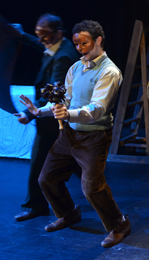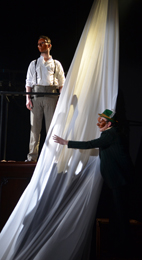Task: take one clunking 700-page Gothic novel, and distil it to a 100-minute drama for the theatre. Impossible? It is, especially if you're aiming to faithfully trace the narrative intricacies (and occasional opacities) of Charles Maturin's glowering 1820 fable Melmoth the Wanderer, whose brooding, darkly obsessive atmosphere so influenced Balzac, Baudelaire, and Maturin's great-nephew Oscar Wilde, who used 'Melmoth' as an alias in his years of post-incarceration exile in Paris.
 Nicola McCartney has wisely avoided trying to pack too much incident into her dramatisation. Instead she chooses five representative stories from the many told in Maturin's novel, using them as archetypes of what she and director Zoë Seaton view as the book's central thematic preoccupation: the nature of evil, and how it can suddenly irrupt in any one of us, given the right (that is, wrong) circumstances.
Nicola McCartney has wisely avoided trying to pack too much incident into her dramatisation. Instead she chooses five representative stories from the many told in Maturin's novel, using them as archetypes of what she and director Zoë Seaton view as the book's central thematic preoccupation: the nature of evil, and how it can suddenly irrupt in any one of us, given the right (that is, wrong) circumstances.
'The Story of the Guzmans' is in this respect emblematic. Seaton casts them as a stereotypically Germanic family, stolidly repeating self-satisfied bourgeois truisms to one another, and happily max-ing out their credit cards in expectation of an imminent inheritance. When it doesn't materialise, the father, sensing financial nemesis, clubs his wife and children to death, only to find the money will be coming after all, and he needn't have bothered.
Violent fortune-reversals of this type, and their summary upending of normal value systems and behaviour, are a recurring feature of McCartney's dramatisation, and a principal source of its pervasive gallows humour. Evil lurks everywhere in Melmoth, manifesting itself in such mawkishly incongruous fashion that laughter - nervous, affrighted, or just plain manic - often seems the only available reaction.
.jpg.aspx%3Fwidth=260&height=170) Seaton's half-masking of the four actors (Shelley Atkinson, Colm Gormley, Claire Lamont, Keith Singleton) in the 'choir' which enacts the stories crucially emphasises the universality of evil's influence on ostensibly ordinary people, and heightens the elements of grotesquerie and absurdity inherent in their alarmingly changeable situations. This mutability of circumstance is further emphasised by the considerable scope for improvisation McCartney embeds in her script. The story-tellers use this virtuosically, sparring verbally, ad-libbing, apeing one another, and generally creating the impression that in an unpredictable world anything can happen (particularly if it's nasty), and may be just about to.
Seaton's half-masking of the four actors (Shelley Atkinson, Colm Gormley, Claire Lamont, Keith Singleton) in the 'choir' which enacts the stories crucially emphasises the universality of evil's influence on ostensibly ordinary people, and heightens the elements of grotesquerie and absurdity inherent in their alarmingly changeable situations. This mutability of circumstance is further emphasised by the considerable scope for improvisation McCartney embeds in her script. The story-tellers use this virtuosically, sparring verbally, ad-libbing, apeing one another, and generally creating the impression that in an unpredictable world anything can happen (particularly if it's nasty), and may be just about to.
Stalking the action as it unravels is the lugubrious figure of the Wanderer, who has sold his soul to the Devil for 150 further years of existence. He appears when other characters are in extremis, attempting to offload his Faustian contract on them when they're most vulnerable to accepting it.
Why does he want rid of it? In Seaton's staging, it's the Wanderer’s world-weariness which is particularly striking: he's simply seen too many of the dark acts human beings perpetrate on one another to want to witness others. That this circle of evil-doing may be forever unbroken is emphasised at the play’s conclusion, where, Finnegans Wake-like, the last words link commodiously to those used at the beginning. We have come full circle, and the grim sequence of misery and malefaction is ready to be once more set in motion.
It's important to emphasise how funny Seaton and the actors have made McCartney’s dramatisation. Monty Python, Morecambe and Wise, and The League of Gentlemen are among the comic antecedents referenced, but it's fascinating to note also how squarely this Melmoth sits within the peculiarly zany, surreal tradition of Irish humour exemplified by Swift, Sterne and Flann O'Brien, among others.
 As 'choir' Atkinson, Gormley, Lamont and Singleton multi-task heroically throughout the evening, switching accents, costumes and ages as they morph into the many different characters of McCartney’s narrative. It’s a marvellously quick-witted, confident demonstration of collective teamwork. Dennis Herdman’s appearances as the Wanderer are necessarily more fleeting, but his keynote speech excoriating the vanity of human wishes is powerfully delivered, as are his mute attempts to rip away the full mask he wears at one point, and forever cast aside the curse of wandering, which denies him peace of mind and blights his true identity.
As 'choir' Atkinson, Gormley, Lamont and Singleton multi-task heroically throughout the evening, switching accents, costumes and ages as they morph into the many different characters of McCartney’s narrative. It’s a marvellously quick-witted, confident demonstration of collective teamwork. Dennis Herdman’s appearances as the Wanderer are necessarily more fleeting, but his keynote speech excoriating the vanity of human wishes is powerfully delivered, as are his mute attempts to rip away the full mask he wears at one point, and forever cast aside the curse of wandering, which denies him peace of mind and blights his true identity.
Deirdre Dwyer’s set is cleverly minimalist, conjuring from a table, chairs, wardrobe, doorway frame, parapet, overhead projector, drapes and curtains a multiplicity of geographical locations. A deliberately episodic soundtrack (Justin Yang) underpins the action in a variety of appropriate idioms.
It’s twenty-five years since Zoë Seaton founded Big Telly, and she could easily have chosen something more obviously populist for this anniversary production. Instead, Zoë Seaton and Nicola McCartney have concocted this fast, edgy, provocative take on Maturin’s novel, deliberately challenging audiences to wonder why it is we often act with such callous disregard for one another, then laugh at the consequences. It’s a darkly comic evening, posing questions that are rivetingly topical, and rightly insisting that it’s we, the audience, who need to find the answers, if answers are indeed available.
Terry Blain